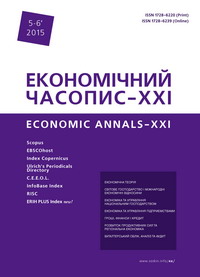The neo-feudalism theory in the context of contemporary economic neo-Marxism
The neo-feudalism theory in the context of contemporary economic neo-Marxism
Author(s): Maksym KyrchanovSubject(s): Economy
Published by: Institute of Society Transformation
Keywords: Economic Theory; History; Neo-Marxism; Neo-Feudalism; Re-Feudalisation
Summary/Abstract: Introduction. The different approaches and ways of actual economic processes interpretation are actively debated in contemporary theoretical economic studies. Purpose of this article is the analysis of the basic theoretical assumptions of neo-feudalism concept in relation to post-Soviet economies transformations in the context of Russia and Ukraine. Results. The theory of neo-feudalism is used by economists of neo- Marxist orientation and critically minded intellectuals for analysis of failure and impossibility of post-Soviet political elites to institutionalize true market capitalist economy. Proponents of the neo-feudalism theory believe that feudalism was a universal form of economic relations. Feudalism is imagined by them as a universal matrix existing despite the formal victory of capitalism. Regionalization, the rise of informal economy, actualization of violence and forced redistribution are the main dimensions and forms of the post-Soviet re-feudalized economies. The interpretation of the results presented in the article. Contemporary economists of neo-Marxist orientation believe that neo-feudalism is among the inevitable economic processes. Neo-feudalism is imagined by them as a progressive historical phenomenon in comparison with the earlier Soviet model of economic development. The neo-feudalism theory has the revisionist character. The concept was a reaction to inability of other classical theories to propose adequate explanation of contemporary economic processes in the post-Soviet states. The author implies that the neo-feudalism theory is among possible theoretical approaches for the comparative post-Soviet economies studies. Conclusions. The theory of neofeudalism pretends to methodological universality as it provides scholars with a mechanism for explanations and interpretations of unique economic conditions emerged in the post-Soviet economies of Russia and Ukraine. The author insists that the concept of neo-feudalism is an integral element of the critical and revisionist approach in actual economic theories that develop in general uncertainty of methodological backgrounds of modern economic processes.
Journal: Економічний часопис - ХХІ
- Issue Year: 151/2015
- Issue No: 05+06
- Page Range: 4-7
- Page Count: 4

